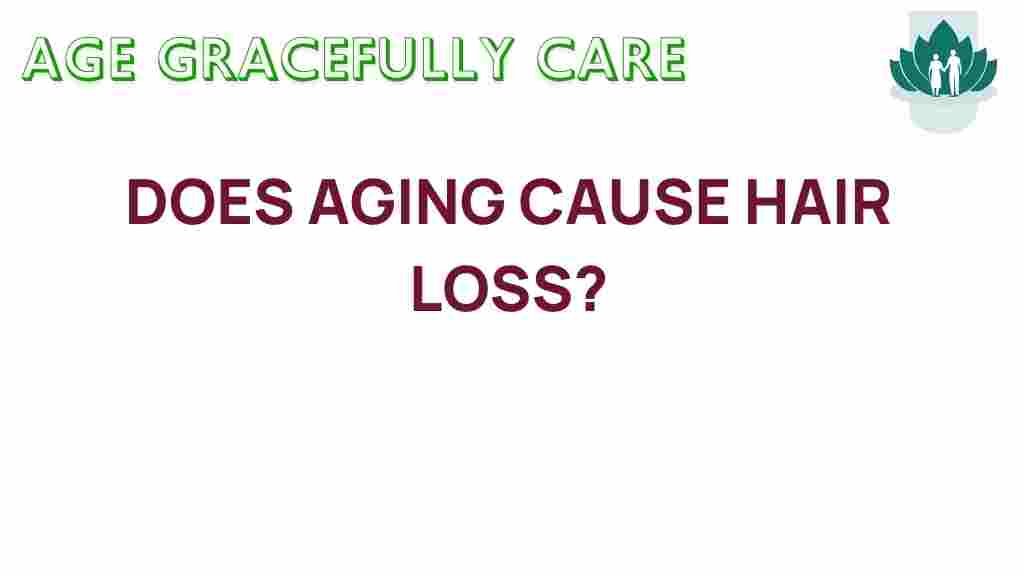Unraveling the Mystery: Does Aging Cause Hair Loss?
Aging is a natural process that affects every part of our body, including our hair. For many, the onset of hair loss can be one of the most noticeable signs of aging. While it’s often thought that aging is the primary culprit behind thinning hair, the reality is much more complex. In this article, we will explore the connection between aging and hair loss, the role of genetics, effective prevention strategies, and remedies to maintain hair health and wellness.
The Connection Between Aging and Hair Loss
As we age, our bodies undergo various biological changes. Hair loss is a common occurrence, and understanding its relationship with aging is crucial. Here are some key points to consider:
- Hair Growth Cycle: Hair goes through a natural growth cycle consisting of three phases: anagen (growth), catagen (transition), and telogen (rest). As we age, the anagen phase shortens, leading to less hair growth.
- Hormonal Changes: Aging affects hormone levels in the body, particularly testosterone and estrogen, which can influence hair growth and loss.
- Genetic Factors: Genetics play a significant role in hair loss. If you have a family history of hair loss, you may be more prone to experiencing it as you age.
The Role of Genetics in Hair Loss
Genetics is one of the most significant factors determining hair loss patterns. Male and female pattern baldness, known scientifically as androgenetic alopecia, is hereditary. Here’s how genetics influences hair loss:
- Inheritance Patterns: Genetic hair loss can be inherited from either side of the family, affecting hair density and growth patterns.
- Age of Onset: The age at which you begin to lose hair can also be influenced by genetics; some may start losing hair in their twenties, while others may not see significant thinning until much later.
- Severity: The extent of hair loss varies greatly among individuals and can be traced back to genetic predisposition.
Preventing Hair Loss as You Age
While aging and genetics are unavoidable, there are proactive steps you can take to promote hair health and potentially prevent excessive hair loss. Here are some effective strategies:
- Healthy Diet: A balanced diet rich in vitamins and minerals can support hair health. Focus on foods high in:
- Protein (e.g., fish, eggs, legumes)
- Iron (e.g., spinach, lentils)
- Omega-3 fatty acids (e.g., walnuts, flaxseeds)
- Biotin (e.g., nuts, avocados)
- Scalp Care: Regular scalp massages can improve blood circulation and promote hair growth. Use essential oils like peppermint or rosemary for added benefits.
- Hydration: Staying hydrated is essential for overall health, including hair health. Aim to drink at least 8 glasses of water a day.
- Avoid Harsh Treatments: Limit the use of chemical treatments, heat styling, and tight hairstyles that can damage hair.
- Stress Management: Chronic stress can lead to hair loss. Engage in stress-reducing activities such as yoga, meditation, or hobbies.
Effective Remedies for Hair Loss
There are several remedies available that may help combat hair loss. While results can vary, here are some popular methods:
- Minoxidil: An over-the-counter topical treatment that stimulates hair growth. It’s suitable for both men and women.
- Finasteride: A prescription medication for men that helps prevent testosterone from converting to DHT, a hormone linked to hair loss.
- Natural Supplements: Consider supplements containing biotin, saw palmetto, or other hair-supporting nutrients.
- Laser Therapy: Low-level laser therapy devices may help stimulate hair follicles and promote hair growth.
- Hair Transplant Surgery: For those with significant hair loss, surgical options such as hair transplants can provide long-lasting results.
Lifestyle Changes to Support Hair Health
Incorporating healthy lifestyle changes can play a vital role in maintaining hair wellness. Here are some suggestions:
- Regular Exercise: Exercise improves blood circulation, which can benefit hair follicles.
- Adequate Sleep: Ensure you get 7-9 hours of quality sleep each night to promote overall health and wellness.
- Limit Alcohol and Tobacco: Reducing alcohol consumption and quitting smoking can positively impact hair health.
- Stay Sun-Safe: Protect your scalp and hair from sun damage by wearing hats or using UV-protectant hair products.
Troubleshooting Hair Loss Issues
If you are experiencing hair loss, it’s essential to identify the underlying causes. Here are some troubleshooting tips:
- Consult a Professional: If hair loss is sudden or severe, consider consulting a dermatologist or a trichologist for a thorough examination.
- Document Changes: Keep a record of any changes in your hair, scalp, diet, or lifestyle that may have coincided with the onset of hair loss.
- Evaluate Products: Assess the products you’re using on your hair and scalp. Switch to gentle, sulfate-free shampoos and conditioners.
- Monitor Stress Levels: Keep track of your stress levels and consider incorporating relaxation techniques into your routine.
Conclusion
In conclusion, while aging is a significant factor in hair loss, it’s not the sole reason. Genetics plays a crucial role, and understanding both can empower individuals to take proactive steps toward prevention and care. By adopting a healthy lifestyle, engaging in proper scalp care, and exploring effective remedies, you can promote hair health and wellness as you age.
Remember, every individual’s journey with hair loss is unique, and what works for one person may not work for another. If you’re experiencing hair loss and seeking personalized solutions, consider reaching out to professionals for guidance. For further reading on hair health and wellness, you can visit this informative article.
Stay proactive about your hair care, and don’t let aging define your hair journey!
This article is in the category Health and created by AgeGracefullyCare Team

1 thought on “Unraveling the Mystery: Does Aging Cause Hair Loss?”